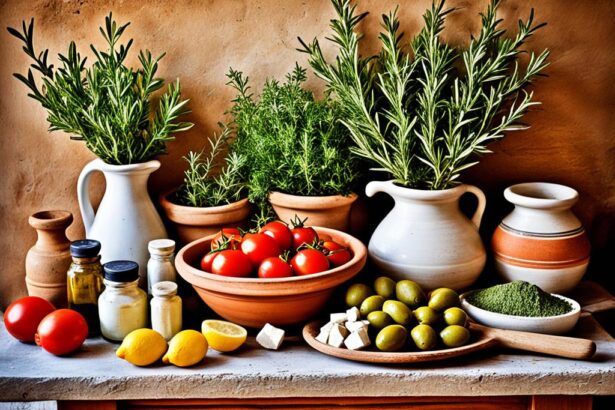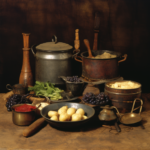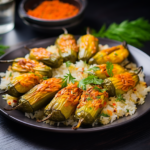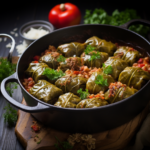Greek food is known for its unforgettable flavors and age-old cooking ways. To make these authentic Greek culinary creations yourself, you need the right tools. First, a set of kitchen knives is crucial. You’ll want a chef’s knife, Santoku knife, paring knife, boning knife, utility knife, and bread knife. These are perfect for many tasks, like chopping veggies for a Greek salad or preparing lamb for Kleftiko.
Don’t forget a solid wooden cutting board. It’s essential for your chopping needs. A wooden board is not only durable but it also keeps your knives sharp.
For true Greek flavors, fresh ground spices and herbs are a must. That’s why a mortar and pestle are essential. Also, an olive oil can is handy for using olive oil easily, which is a key ingredient in Greek dishes.
Among other things, you’ll need wooden spoons for mixing sauces, a cheese grater, and a pepper grinder. These items help with cooking and bring out the true flavors of Greek food.
Master Your Kitchen with These Essential Greek Cooking Utensils: A Guide to Traditional Greek Cooking Equipment, Classic Greek Kitchen Essentials, and Ancient Greek Cooking Tools
Enhance your culinary skills by discovering the best Greek cooking tools and essential Greek cooking utensils. Dive into the world of authentic Greek recipes with the right equipment at your fingertips.
Key Takeaways Classic Greek Kitchen Essentials
- A variety of kitchen knives are crucial for precise ingredient preparation.
- A wooden cutting board is essential for durability and knife maintenance.
- A mortar and pestle is vital for grinding fresh spices and herbs.
- Utilizing tools like an olive oil can, wooden spoons, cheese grater, and pepper grinder enhances Greek cooking.
- These kitchen essentials uphold the authenticity and rich flavors of Greek cuisine.
Must-Have Oils and Seasonings -Classic Greek Kitchen Essentials
Greek cuisine uses a mix of flavors. Oils and seasonings are key to its taste. Greek cooking oil and lemon dressing add depth and zest. They play a big role in the food experience.
Extra Virgin Olive Oil
Crete’s extra virgin olive oil is a must in Greek dishes. It’s known for low acidity and a unique taste. Gaea, Kalamata, and Eleones are famous brands. This Greek cooking oil keeps its flavors and benefits through cold pressing or centrifugation.
Oregano
Oregano is essential in a Greek kitchen. It goes well with olive oil, boosting Mediterranean flavors. You can use it fresh or dried. It’s key for Greek dishes.
Lemons
Lemons are crucial in Greek food. They’re often in marinades and lemon dressing. Their zest and juice add life to meals. Lemons are truly important for seasoning.
Sea Salt and Freshly Ground Pepper
Sea salt and pepper are basic but vital in Greek cooking. They bring out the taste of foods. These seasoning essentials are necessary for the right flavor in Greek meals.
Essential Greek Dairy and Cheese
Greek cheeses are key in Greek kitchens. They showcase a rich tradition within the Mediterranean diet. Feta cheese, Greek yogurt, and halloumi are at the heart of many Greek dishes.
Feta Cheese
Feta is essential in Greek cuisine. Made from goat’s and sheep’s milk, it’s crucial in the Mediterranean diet. Its crumbly texture and tangy taste make it great for salads, pies, and grilled dishes. I love adding lots of feta to my Greek salad—it tastes amazing!
Greek Yogurt
Greek yogurt is next up. It’s a thick, creamy dairy delight, often made richer by straining. It’s perfect in dips, sauces, marinades, or with honey and nuts. Its versatility and texture make it a must-have in Mediterranean cooking.
Halloumi
Last, we look at halloumi. Even though it comes from Cyprus, it’s loved in Greek food. It stays firm when grilled or fried, adding a savory touch to salads and sandwiches. Grilled halloumi with tomato and basil is one of my summer favorites.
These dairy products do more than just taste good. They keep up the rich heritage of Greek food. Whether it’s feta or Greek yogurt, each mouthful brings the Mediterranean diet’s traditions to life.
Classic Greek Kitchen Essentials Tools You Can’t Do Without
Making traditional Greek recipes needs the right Greek kitchen tools. The Greeks value certain culinary tools to boost their dishes’ flavors and authenticity.
Mortar and Pestle
The mortar and pestle are key for Greek cooking. They’re used to grind herbs and spices. Ingredients like oregano, garlic, and pepper seeds are crushed to release flavors key to Mediterranean cuisine.
Wooden Spoons
In Greek kitchens, wooden spoons are very important. They’re perfect for stirring acidic ingredients like lemon juice, crucial in Greek recipes. This ensures the dish’s flavor stays true and authentic.
Cheese Grater
A cheese grater is a must-have in Greek kitchens. It’s used for grating feta for various dishes, from salads to pastries. It also zests lemons, adding freshness to the dishes.
Pepper Grinder
A quality pepper grinder is vital for adding freshly ground pepper, a common spice in Greek food. It enhances dishes like moussaka or Greek salad with bold flavors. It’s a key tool for authentic Greek cooking.
With these tools, anyone can make traditional Greek dishes at home. They help bring out the rich and delightful flavors of Greek recipes.
Classic Greek Kitchen Essentials for Authentic Cooking
Greek cooking traditions come alive with certain kitchen essentials. These include both tools and ingredients vital for authentic dishes. Using kitchen knives is key in preparing Greek meals. Types like the Chef’s Knife and Santoku Knife are crucial.
A wood cutting board is a better choice for cutting ingredients. It’s seen as cleaner than plastic ones.
mortar and pestle
This tool is critical for mashing fresh garlic and herbs and grinding spices. It boosts flavors in Greek dishes.
Greek recipes often call for olive oil, best dispensed from an olive oil can. Wooden spoons are favored for their heat resistance, crucial in sauce-making. A cheese grater is a must for adding cheese to dishes like saganaki. A pepper grinder ensures fresh pepper in recipes.
| Tool | Description | Importance |
|---|---|---|
| Kitchen Knives | Chef’s Knife, Santoku Knife, Paring Knife, Boning Knife, Utility Knife, Bread Knife | Essential for precision in preparing ingredients for various Greek dishes. |
| Wood Cutting Boards | Sturdy and more sanitary than plastic alternatives | Ideal for slicing and dicing ingredients. |
| Mortar and Pestle | Used for pounding fresh garlic, herbs, grinding spices | Enhances flavors in traditional Greek recipes. |
| Olive Oil Can | Convenient for dispensing olive oil | Integral to Greek cooking. |
| Wooden Spoons | Heat resistant and non-reactive | Important for stirring sauces. |
| Cheese Grater | Process both soft and firm cheeses | Essential for dishes like saganaki and moussaka. |
| Pepper Grinder | Provides freshly ground pepper | Finishing touch for traditional recipes. |
For souvlaki, skewers are needed, and whisks help with sauces like latholemono. Large saucepans are vital for complex dishes. Metal baking pans suit both savory and sweet recipes. A rotisserie is ideal for whole lamb or goat, embracing the taste of Greece. Honey dippers and pastry brushes aid in making desserts like loukoumades and working with phyllo dough.
With these essentials, creating traditional Greek dishes becomes easy. From tools to cooking aids, they embody Greek culinary spirit. This ensures your cooking is truly Greek, rich in flavors and tradition.
Pivotal Greek Herbs and Spices
Greek culinary traditions are rich and diverse. They often feature unique herbs from their own gardens. The blend of Mediterranean herbs and spices creates flavors unique to Greek food. Let’s look at some key herbs and spices that make Greek cuisine stand out.

Fresh Basil and Thyme
Fresh basil and thyme are key in Greek kitchens. They add depth to a wide range of dishes. From salads to complex meat preparations, they’re flavor heroes.
Mint and Parsley
Mint and parsley add a bright touch to Greek dishes. Tzatziki and lamb dishes often include mint, while parsley upgrades dolmades and salads. Mint also pops up in Greek drinks, adding a cool twist.
Bay Leaf and Dill
Bay leaf and dill offer richness and an earthy vibe to Greek recipes. Bay leaves enrich broths, soups, and stews with a signature scent. Dill pairs well with seafood and tzatzizki, providing a subtle flavor lift.
Cinnamon and Nutmeg
Cinnamon and nutmeg play a huge role in Greek cooking. They’re key for sweet and savory classics like baklava. These spices are essentials for adding warmth and richness to Greek dishes.
A spice grater is crucial for unlocking the magic of these spices. It ensures they blend perfectly into meals.
Fundamental Greek Grains and Legumes
Greek cuisine shines because of grains and legumes. These Greek pantry essentials are key to traditional dishes. They also support the healthy Mediterranean diet grains. The history of grains in Greek food goes back centuries. It’s been influenced by Romans, Venetians, Turks, Slavs, and English.
From Alexander the Great to today, grains and legume varieties are central in Greek meals. They tell the story of Greece’s culinary past.
Orzo
Orzo looks like rice but is a grain. It’s in many loved Greek foods. You can find it in soups, salads, or as a side. It brings a nice texture.
One dish, “Kritharaki,” uses orzo a lot. This shows its value in Greek cuisine essentials.
Fat Macaroni Pasta
In Greece, “Makaronia” is a type of pasta. It’s used in “Pastitsio,” a dish with layers and béchamel sauce. This dish shows how grains make comfort food. It also shows their role in Mediterranean diet grains.
Paximadia (Rusks)
Paximadia, or rusks, are dry, crunchy bread. They are great for toppings or in salads. This bread shows the smart use of grains in Greek food history. It’s an old baking tradition.
Legumes, like beans, lentils, chickpeas, and split peas, have been vital in Greek food since the Stone Age.
Grains and legumes are must-haves in the Greek kitchen. Dishes like “gigantes sto fourno” and “fasolada” show their importance. They make meals hearty. Including them in daily cooking connects Greek tradition with choosing the right pantry items.
Necessary Greek Bread and Pastries
In the world of Greek cooking, bread and pastries are very important. They add flavor and texture to meals. *Pita bread* and *phyllo dough* are especially key. They are used in many ways, making Greek food special.
Pita Bread
*Essential Greek bread,* like pita, is found in nearly every Greek meal. It’s soft and perfect for dipping into sauces or holding fillings. You can use it for souvlaki and gyros. Pita is loved for being easy to bake and great with many foods.
Phyllo Dough
*Phyllo dough* is crucial when talking about Greek pastries. This thin pastry is important in dishes like spanakopita and baklava. Making it requires skill. This showcases the finesse in *Greek pastry techniques*.
Baklava Components
Baklava is a prized dessert, known for its layers of phyllo, nuts, and honey. It combines quality phyllo, walnuts, pistachios, and Greek honey. The right baking tray and brushing method are key. They help baklava get its crunchy, golden layers.
Adding *phyllo-based recipes* to your kitchen skills is smart. It lets you explore Greek dishes and play with different tastes and textures.
Greek Kitchen Appliances and Gadgets
Greek cooking mixes old ways with new tech. This creates a kitchen filled with Greek tools that honor tradition and welcome innovation. I often use a food processor to cut prep time. It chops and blends evenly. Yet, I’m careful not to overdo it. Keeping the food’s texture is key in real Greek meals.
p>
The Mouli-Legume is a must-have in my kitchen. It’s perfect for making foods smooth and strained. Despite new gadgets, this manual tool stands its ground. It shows some old methods are unbeatable.
In dealing with Greek kitchen tools, finding a balance is vital. I blend manual tools with modern gadgets. This keeps Greek food’s true taste while saving time with new tech.
Greek Cooking Equipment
Learning Greek cooking involves many techniques and special tools. You need the right equipment to make traditional Greek meals. Some items help you cook like a pro, blending flavors and textures perfectly.
Large Saucepans
Large saucepans are key for Greek cooking, especially for dishes cooked on the stove like casseroles. They allow you to mix ingredients well. This helps the flavors come together just right.
Metal Baking Pans
Metal pans are essential for Greek baking. They’re used for dishes such as moussaka, spanakopita, and baklava. These pans help achieve the right texture and taste.
Spit Roaster or Rotisserie
A spit roaster or rotisserie is crucial for traditional Greek roasting. It’s perfect for cooking lamb or goat. This method makes the meat tender and juicy, just how it’s meant to be.
Food Processor
A food processor makes Greek cooking easier. It’s great for chopping veggies or making sauces. It combines old cooking styles with modern convenience.
| Equipment | Purpose |
|---|---|
| Large Saucepans | Preparing braised casseroles and simmering sauces. |
| Metal Baking Pans | Baking dishes like moussaka, spanakopita, and baklava. |
| Spit Roaster or Rotisserie | Roasting whole lamb or goat for authentic Greek flavors. |
| Food Processor | Chopping, blending, and refining ingredients for various dishes. |
Conclusion
Integrating classic Greek kitchen essentials into modern cooking gives a real taste of Greek traditions. Ancient Greeks loved grains, olives, and grapes. Yet, they also welcomed new crops like tomatoes and zucchini. Olive oil links old and new Greek cooking ways.
Embracing Mediterranean food means exploring diverse proteins in the Greek diet. This ranges from legumes to dairy. Given Greece’s islands, fish and seafood are diet staples, reflecting a long maritime culture. Grilled foods and regional dishes show the richness of Greek food history.
Greek cuisine has evolved for various reasons. One turning point was when the Roman Empire’s capital moved to Constantinople in 330 A.D. This introduced Turkish tastes, seen in tzatziki and dolmades. In 330 B.C., Archestratos wrote the first cookbook, highlighting Greek culinary importance. Modern chefs, wearing hats like Greek monks, honor vegetarian dishes and other Greek traditions. They preserve the Mediterranean diet’s charm. With the right kitchen setup, anyone can dive into the heart of Mediterranean cooking. It’s a flavorful and historical journey.
FAQ
What are some must-have oils and seasonings for Greek cooking?
A: Extra virgin olive oil from Crete is a must, along with oregano, lemons, sea salt, and freshly ground pepper. These key ingredients bring out the rich, authentic flavors of Greek cuisine.
Which dairy products are essential in a Greek kitchen?
A: Feta cheese, Greek yogurt, and halloumi are essential. Feta is great in salads and pies. Greek yogurt is perfect for dips like tzatziki, and halloumi adds fantastic texture and flavor to dishes.
What are the essential tools for an authentic Greek kitchen?
Essential tools include a traditional mortar and pestle, wooden spoons, a cheese grater, and a pepper grinder. These help grind spices, stir ingredients without reacting, grate cheese finely, and grind pepper freshly.
Which herbs and spices are pivotal in Greek cooking?
A: Fresh basil, thyme, mint, parsley, bay leaf, dill, cinnamon, and nutmeg are pivotal. They provide the aromatic and earthy notes key to Greek dishes.
What grains and legumes are fundamental to Greek cuisine?
A: Orzo and fat macaroni pasta are fundamental grains, while paximadia (rusks) add a crunchy texture. These are used in many traditional Greek dishes.
What types of bread and pastries are integral to Greek meals?
A: Pita bread and phyllo dough are integral. Pita is versatile for dips and kebabs. Phyllo is key in savory and sweet pastries. Ingredients for baklava like honey and nuts are also vital.
Which kitchen appliances and gadgets are helpful in Greek cooking?
A: Food processors and the Mouli-Legume are great for saving time and getting consistent results. Even with modern tools, traditional equipment is important for authentic Greek cooking.
What cooking equipment is essential in Greek cuisine?
Essential equipment includes large saucepans for casseroles, metal baking pans for layering dishes like moussaka and baklava, a spit roaster or rotisserie for meats, and a food processor for efficient prep.
-
Crispy Fried Zucchini Fries Recipe – A Delicious Appetizer
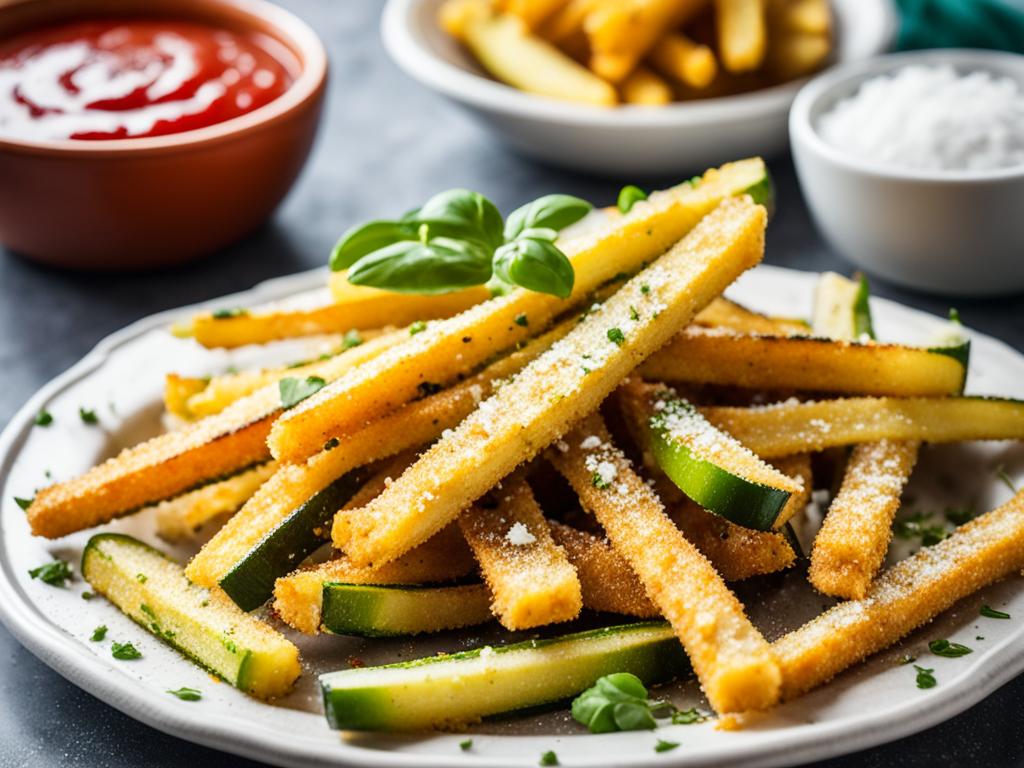
I love preparing fried zucchini, also known as zucchini crisps, chips, or bites. It’s an incredibly delicious appetizer that can easily fit various names and forms. What makes fried zucchini so appealing is the perfect balance of the crispy exterior and the naturally juicy zucchini inside. This contrast remains delightful even as the zucchini crisps…
-
Peter Parthenis: The Greek Who Made Gyros Popular in America
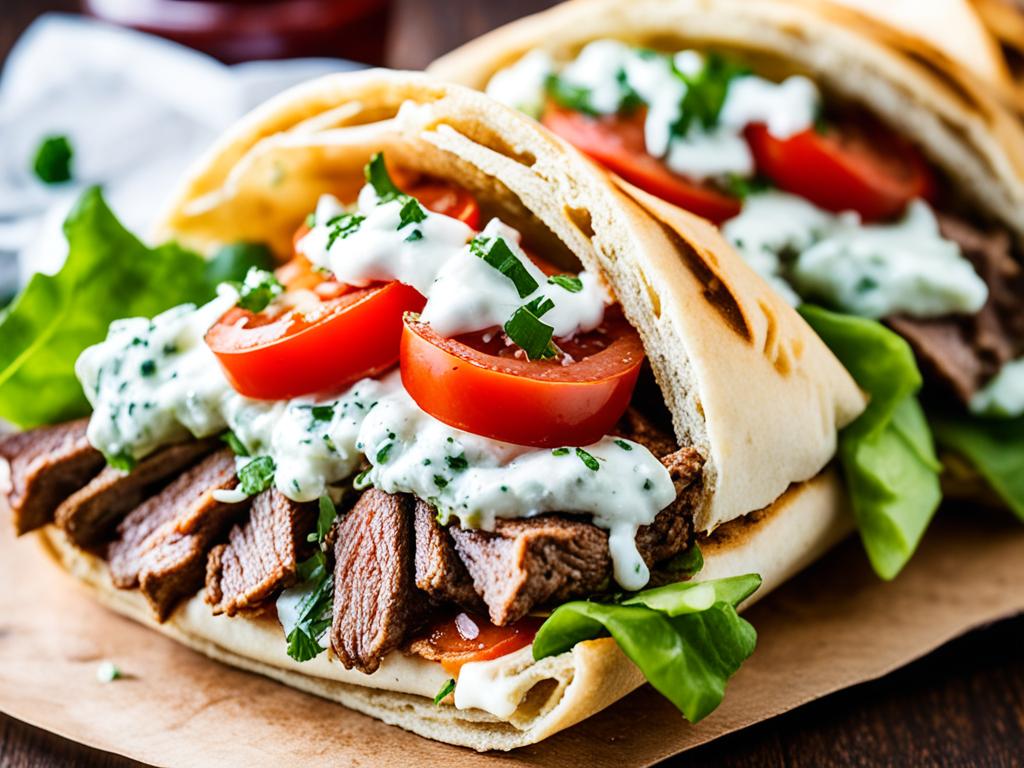
Peter Parthenis Sr. is a name synonymous with innovation in the realm of Greek cuisine and immigrant entrepreneurship. After immigrating from the quaint village of Vonitsa, Greece, he harnessed his expertise as an automation engineer to found Kronos Foods in Chicago in 19741. Parthenis is credited with popularizing the gyro sandwich in America, transforming the…
-
Greek Pork Gyros: Savor the Authentic Flavor
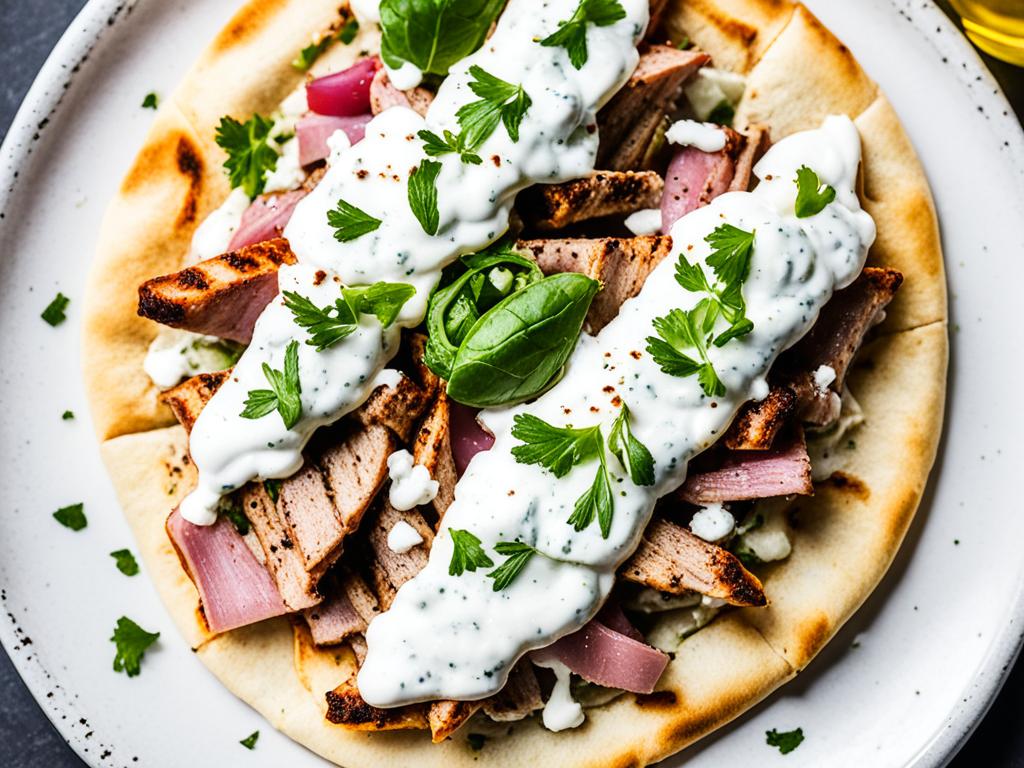
Embark on a culinary journey to the heart of Greece with my Authentic Greek Pork Gyros recipe. This delightful twist on classic Greek street food stands out for its tender, flavorful pork marinated to perfection. For an optimal flavor profile, the meat should be brined for 24 hours and marinated for at least 3 hours.…






